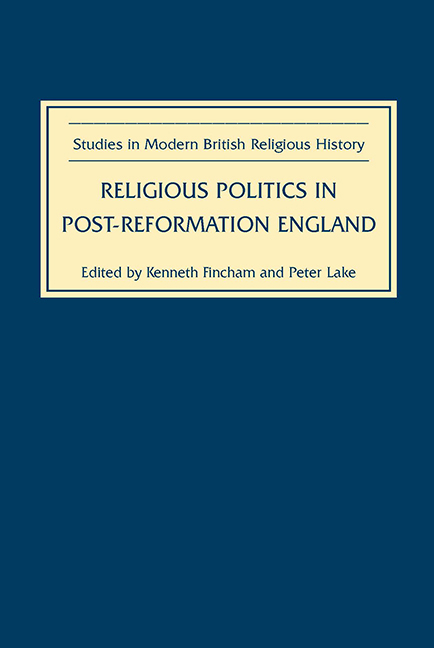Book contents
- Frontmatter
- CONTENTS
- Dedicaton
- Miscellaneous Frontmatter
- Preface
- Abbreviations
- 1 Introduction: Puritanism, Arminianism and Nicholas Tyacke
- 2 Art and Iconoclasm in Early Modern England
- 3 The Latitude of the Church of England
- 4 Joan of Contention: The Myth of the Female Pope in Early Modern England
- 5 Anti-Puritanism: The Structure of a Prejudice
- 6 The Fortunes of English Puritanism: An Elizabethan Perspective
- 7 What's in a Name? Dudley Fenner and the Peculiarities of Puritan Nomenclature
- 8 Puritan Preachers and their Patrons
- 9 New England's Reformation: ‘Wee shall be as a Citty upon a Hill, the Eies of All People are upon Us’
- 10 ‘Anglicanism’ by Stealth: The Career and Influence of John Overall
- 11 Destroyed for doing my Duty: Thomas Felton and the Penal Laws under Elizabeth and James I
- 12 Charles I and Providence
- 13 John Shawe and Edward Bowles: Civic Preachers at Peace and War
- 14 Material Evidence: The Religious Legacy of the Interregnum at St George Tombland, Norwich
- Index
- Tabula Gratulatoria
- Studies in Modern British Religious History
7 - What's in a Name? Dudley Fenner and the Peculiarities of Puritan Nomenclature
Published online by Cambridge University Press: 25 October 2017
- Frontmatter
- CONTENTS
- Dedicaton
- Miscellaneous Frontmatter
- Preface
- Abbreviations
- 1 Introduction: Puritanism, Arminianism and Nicholas Tyacke
- 2 Art and Iconoclasm in Early Modern England
- 3 The Latitude of the Church of England
- 4 Joan of Contention: The Myth of the Female Pope in Early Modern England
- 5 Anti-Puritanism: The Structure of a Prejudice
- 6 The Fortunes of English Puritanism: An Elizabethan Perspective
- 7 What's in a Name? Dudley Fenner and the Peculiarities of Puritan Nomenclature
- 8 Puritan Preachers and their Patrons
- 9 New England's Reformation: ‘Wee shall be as a Citty upon a Hill, the Eies of All People are upon Us’
- 10 ‘Anglicanism’ by Stealth: The Career and Influence of John Overall
- 11 Destroyed for doing my Duty: Thomas Felton and the Penal Laws under Elizabeth and James I
- 12 Charles I and Providence
- 13 John Shawe and Edward Bowles: Civic Preachers at Peace and War
- 14 Material Evidence: The Religious Legacy of the Interregnum at St George Tombland, Norwich
- Index
- Tabula Gratulatoria
- Studies in Modern British Religious History
Summary
My father claimed to have heard of someone called We-came-into-thisworld- with-nothing-and-it-is-certain-we-shall-take-nothing-out Jones. Praise God Barebone, who gave his name to an English parliament, is said to have had a brother named If-Christ-had-not-died-for-thee-thou-hadst-been-damned Barebone, whose name was shortened to Damned Barebone. More securely documented are the following baptismal names: Stand-fast-on-high, and Fight-the-good-fightof- faith. Of all the peculiarities of puritanism, none has attracted more interest, part hostile, part humorous, than the practice of some puritans (and, as we shall see, the ‘some’ is significant) of bestowing on their children unusual names, having ‘some godly signification’.
For all his anti-puritanism William Camden was more amused than indignant, since the practice had ‘no evil meaning, but upon some singular and precise conceit’. He thought it more reprehensible, ‘another more vain absurdity’, to give Christian names to pet animals. His list of peculiar names, including More fruit, From above and Dust can, as we shall see, be confirmed from the historical record. Camden's friend Ben Jonson, with probable indebtedness to Camden, employed the peculiarities of puritan naming to devastating effect in his anti-puritan city comedies, ‘Bartholomew Fair’ and ‘The Alchemist’. But for Jonson, it is perhaps unlikely that a bishop of London would have asked in his visitation of 1612 whether any children had been given a name in baptism ‘absurd, or inconvenient for so holy an action’.3
That any burgess of Banbury ever christened his son Zeal-of-the-land is perhaps unlikely. He certainly would not have done so in the 1560s or 1570s, when the character of Zeal-of-the-land Busy would have been born. But whereas we change, all the cells of our bodies, our names do not, unless we take steps to alter them. When the godly Sussex minister John Frewen, rector of Northiam, called his son Accepted, he could hardly have expected that Accepted Frewen would become archbishop of York, which happened in 1660, by which date the world his father had known had changed several times. Accepted had a brother, Thankful, a minor civil servant and, like Accepted, an Anglican royalist. Accepted was perhaps embarrassed by his strange Christian name. The fact that he was sometimes called ‘Stephen’ saved his bacon on two occasions in the years of the civil war.
- Type
- Chapter
- Information
- Religious Politics in Post-Reformation England , pp. 113 - 127Publisher: Boydell & BrewerPrint publication year: 2006

